专插本必备语法
专插本基础语法

掌握语法的核心基础(暑期班前完成)第一章基本句型及补语第二章名词词组与冠词第三章动词时态第一章基本句型及补语初级句型——简单句(Simple Sentences)简单句掌握得好,对各种主要词类能够运用自如,之后才有资格进入复句、合句。
基本句型是语法最重要的基础。
基本句型搞不明白,后面的所有语法难点也不可能搞得明白。
五种单句的基本句型:1. S+V (主语+动词)2. S+V+O (主语+动词+宾语)S:主语3. S+V+C (主语+动词+补语)V:动词4. S+V+O+O (主语+动词+宾语+宾语)O:宾语5. S+V+O+C (主语+动词+宾语+补语)C:补语虽然从初中开始就教五种基本句型,可是其中有两种(句型3和句型5)关于补语的句型,许多人恐怕一直没有真正搞清楚是怎么回事。
如果有五分之二的简单句没有弄懂,接下来的复句可就没办法弄清楚了。
所以补语是第一个需要加强的观念。
传统语法处理这个问题时,照例是取一些名词来搪塞过去,像“补语”这个词本身,以及“不完全不及物动词”和“不完全及物动词”等等。
动词的及物或不及物还是比较容易了解的观念,至于什么叫做“不完全”,在传统语法中一直没有讲清楚,连带什么叫做“补语”也就不甚明确。
其实,要了解补语,只需要研究那些解释为“是”的动词。
基本句型分五种,是因为有五种特性不同的动词而造成的。
在所有的英语动词中,只有解释为“是”的动词是空的,完全没有意义。
也只有这种动词才需要补语来补足句子的意思。
先回到出发点来说。
一个完整的句子,必须能够表达完整的意思。
这需要以两个部分来完成:主语和动词。
主语,是这个句子所叙述的对象。
动词,构成叙述的主要内容。
例如:1. John Smith died in World War Two.(约翰·史密斯死于第二次世界大战。
)2. John Smith killed three enemy soldiers.(约翰·史密斯杀了三名敌军士兵。
广东专插本英语语法必考点与常考点归纳

广东专插本英语语法必考点与常考点归纳★考点:代词both,either等★技巧:both两者都,肯定,谓语用复数neither两者都不,否定,谓语用单数either两者中任何一个,谓语用单数none三者或以上都不,否定,谓语用单数all三者或以上都,肯定,谓语用复数★考点:用a还是an★技巧:单词以元音开头用an,注意是元音音标而非元音字母(a,e,i,o,u);其余用a.冠词a和the★技巧:特指用the,泛指用a;演奏乐器加the,球类运动不加the。
★考点:the+形容词/分词★技巧:合表示某一类人或物,常表复数,如therich富人们;the old老人们;the injured 伤员。
★考点:演奏乐器前加the★技巧:表示演奏乐器时万乐器前要加the;运动和三餐无需加the。
★考点:强调句★技巧:看到it is开头就首先怀疑是否考强调句!判断强调句的方法,把it is/was..that/who去掉,剩下的句子仍成为弗路的正确的句子,则此句是强调句,反之不是;★考点:enough的位置★技巧:形容词/副词+enough;enough+名词给我背熟这两个表达即可:tall enough,enough money★考点:复合不定代词位置★技巧:复合不定代词,即两个不定代词组合成一个新的代词(如something,somebody,anything,everyone等),它的定语入即修饰它的形容词)必须后置,也就是放在复合不定代词的后面。
记住something interesting即可!★考点:区分代词few,a few,lttle, a lttle★技巧:主要对比可数不可数,肯定与否定afew和a lttle,表肯定few和lilttle,表否定few和a few,修饰可数名词little和a Ittle修饰不可数名词★考点:情态动词★技巧:以下词简单理解即可,线左边现在时,线右边过去时,不建议再深入区分can---could能be able to能(用于将来)will--would会shall--should会should=ought to应该(要做)may--might也许must必须(主观)have不得不(客观)had better do最好(做某事)动词用原形used to do过去常常做某事,动词用原形be used to doing习惯做某事,动词用ing ★考点:情态动词+have done★技巧:would/should(=ought to)/could+have done,表示,本会/本应/本能,否定直接加not;must have done表过去一定怎样,注意否定为can't/couldn't have done,表过去不可能怎样。
专插本英语语法专项复习
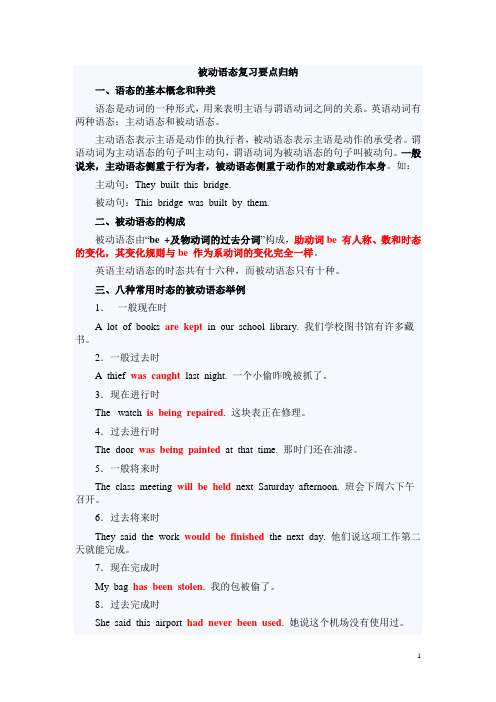
被动语态复习要点归纳一、语态的基本概念和种类语态是动词的一种形式,用来表明主语与谓语动词之间的关系。
英语动词有两种语态:主动语态和被动语态。
主动语态表示主语是动作的执行者,被动语态表示主语是动作的承受者。
谓语动词为主动语态的句子叫主动句,谓语动词为被动语态的句子叫被动句。
一般说来,主动语态侧重于行为者,被动语态侧重于动作的对象或动作本身。
如:主动句:They built this bridge.被动句:This bridge was built by them.二、被动语态的构成被动语态由“be +及物动词的过去分词”构成,助动词be 有人称、数和时态的变化,其变化规则与be 作为系动词的变化完全一样。
英语主动语态的时态共有十六种,而被动语态只有十种。
三、八种常用时态的被动语态举例1.一般现在时A lot of books are kept in our school library. 我们学校图书馆有许多藏书。
2.一般过去时A thief was caught last night. 一个小偷昨晚被抓了。
3.现在进行时The watch is being repaired. 这块表正在修理。
4.过去进行时The door was being painted at that time. 那时门还在油漆。
5.一般将来时The class meeting will be held next Saturday afternoon. 班会下周六下午召开。
6.过去将来时They said the work would be finished the next day. 他们说这项工作第二天就能完成。
7.现在完成时My bag has been stolen. 我的包被偷了。
8.过去完成时She said this airport had never been used. 她说这个机场没有使用过。
四、被动语态的用法1.当不知道谁是动作的执行者时,用被动语态。
专插本_大学英语语法总结
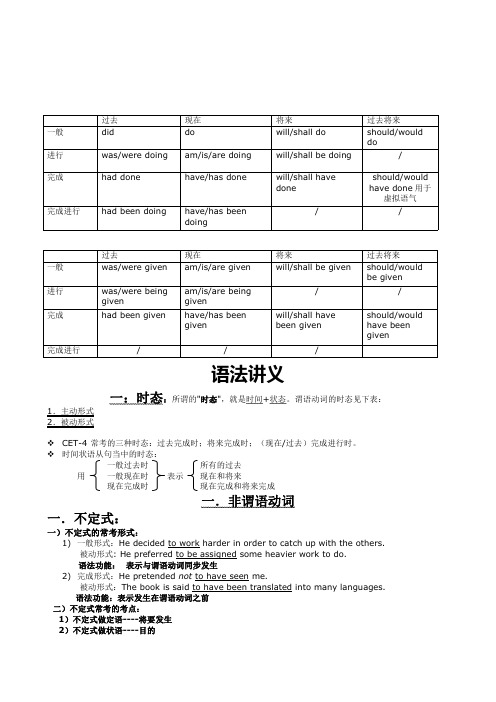
语法讲义一:时态:所谓的"时态",就是时间+状态。
谓语动词的时态见下表:1.主动形式2.被动形式CET-4常考的三种时态:过去完成时;将来完成时;(现在/过去)完成进行时。
时间状语从句当中的时态:一般过去时所有的过去用一般现在时表示现在和将来现在完成时现在完成和将来完成一.非谓语动词一.不定式:一)不定式的常考形式:1)一般形式:He decided to work harder in order to catch up with the others.被动形式:He preferred to be assigned some heavier work to do.语法功能:表示与谓语动词同步发生2)完成形式:He pretended not to have seen me.被动形式:The book is said to have been translated into many languages.语法功能:表示发生在谓语动词之前二)不定式常考的考点:1)不定式做定语----将要发生2)不定式做状语----目的过去现在将来过去将来一般diddowill/shall do should/would do进行was/were doing am/is/are doing will/shall be doing /完成had donehave/has donewill/shall have doneshould/would have done 用于虚拟语气完成进行had been doinghave/has been doing//过去现在将来过去将来一般was/were given am/is/are given will/shall be givenshould/would be given进行was/were being givenam/is/are being given//完成had been givenhave/has been givenwill/shall have been givenshould/would have been given完成进行///3)不定式充当名词功能---To see is to believe.三)不定式的省略1)感官动词see,watch,observe,notice,look at,hear,listen to,smell,taste,feel+do表示动作的完整性,真实性;+doing表示动作的连续性,进行性I saw him work in the garden yesterday.昨天我看见他在花园里干活了。
专插本英语语法大全精编版
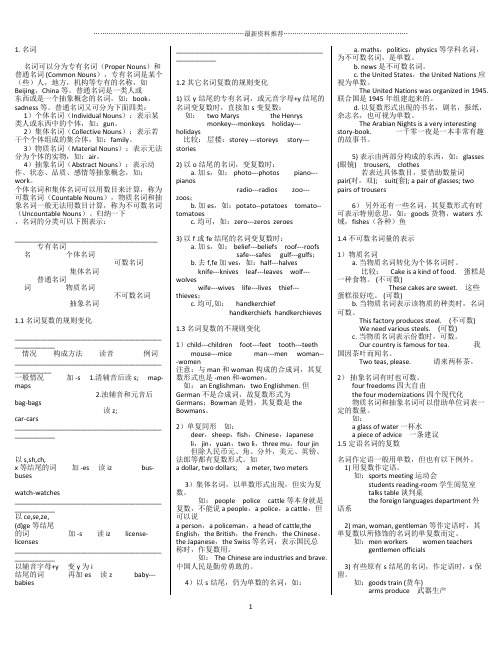
1. 名词名词可以分为专有名词(Proper Nouns)和普通名词 (Common Nouns),专有名词是某个(些)人,地方,机构等专有的名称,如Beijing,China等。
普通名词是一类人或东西或是一个抽象概念的名词,如:book,sadness等。
普通名词又可分为下面四类:1)个体名词(Individual Nouns):表示某类人或东西中的个体,如:gun。
2)集体名词(Collective Nouns):表示若干个个体组成的集合体,如:family。
3)物质名词(Material Nouns):表示无法分为个体的实物,如:air。
4)抽象名词(Abstract Nouns):表示动作、状态、品质、感情等抽象概念,如:work。
个体名词和集体名词可以用数目来计算,称为可数名词(Countable Nouns),物质名词和抽象名词一般无法用数目计算,称为不可数名词(Uncountable Nouns)。
归纳一下,名词的分类可以下图表示:_______________________________________ 专有名词名个体名词可数名词集体名词普通名词词物质名词不可数名词抽象名词1.1 名词复数的规则变化________________________________________ ___________情况构成方法读音例词________________________________________ __________一般情况加 -s 1.清辅音后读s; map-maps2.浊辅音和元音后bag-bags读 z;car-cars________________________________________ ___________以s,sh,ch,x等结尾的词加 -es读 iz bus-buseswatch-watches________________________________________ ___________以ce,se,ze,(d)ge等结尾的词加 -s读 iz license-licenses________________________________________ ___________以辅音字母+y变y 为i结尾的词再加es读 z baby---babies ___________________________________________________1.2 其它名词复数的规则变化1) 以y结尾的专有名词,或元音字母+y 结尾的名词变复数时,直接加s变复数:如:two Marys the Henrysmonkey---monkeys holiday---holidays比较:层楼:storey ---storeys story---stories2) 以o 结尾的名词,变复数时:a. 加s,如: photo---photos piano---pianosradio---radios zoo---zoos;b. 加es,如:potato--potatoes tomato--tomatoesc. 均可,如:zero---zeros zeroes3) 以f或fe 结尾的名词变复数时:a. 加s,如: belief---beliefs roof---roofssafe---safes gulf---gulfs;b. 去f,fe 加ves,如:half---halvesknife---knives leaf---leaves wolf---wolveswife---wives life---lives thief---thieves;c. 均可,如:handkerchiefhandkerchiefs handkerchieves1.3 名词复数的不规则变化1)child---children foot---feet tooth---teethmouse---mice man---men woman---women注意:与 man 和 woman构成的合成词,其复数形式也是 -men 和-women。
专插本英语语法大全

1. 名词名词可以分为专有名词(Proper Nouns)和普通名词 (Common Nouns),专有名词是某个(些)人,地方,机构等专有的名称,如Beijing,China等。
普通名词是一类人或东西或是一个抽象概念的名词,如:book,sadness等。
普通名词又可分为下面四类:1)个体名词(Individual Nouns):表示某类人或东西中的个体,如:gun。
2)集体名词(Collective Nouns):表示若干个个体组成的集合体,如:family。
3)物质名词(Material Nouns):表示无法分为个体的实物,如:air。
4)抽象名词(Abstract Nouns):表示动作、状态、品质、感情等抽象概念,如:work。
个体名词和集体名词可以用数目来计算,称为可数名词(Countable Nouns),物质名词和抽象名词一般无法用数目计算,称为不可数名词(Uncountable Nouns)。
归纳一下,名词的分类可以下图表示:_______________________________________ 专有名词名个体名词可数名词集体名词普通名词词物质名词不可数名词抽象名词1.1 名词复数的规则变化________________________________________ ___________情况构成方法读音例词________________________________________ __________一般情况加 -s 1.清辅音后读s; map-maps2.浊辅音和元音后bag-bags读 z;car-cars________________________________________ ___________以s,sh,ch,x等结尾的词加 -es读 iz bus-buseswatch-watches________________________________________ ___________以ce,se,ze,(d)ge等结尾的词加 -s读 iz license-licenses________________________________________ ___________以辅音字母+y变y 为i结尾的词再加es读 z baby---babies________________________________________ ___________1.2 其它名词复数的规则变化1) 以y结尾的专有名词,或元音字母+y 结尾的名词变复数时,直接加s变复数:如:two Marys the Henrysmonkey---monkeys holiday---holidays比较:层楼:storey ---storeys story---stories2) 以o 结尾的名词,变复数时:a. 加s,如: photo---photos piano---pianosradio---radios zoo---zoos;b. 加es,如:potato--potatoes tomato--tomatoesc. 均可,如:zero---zeros zeroes3) 以f或fe 结尾的名词变复数时:a. 加s,如: belief---beliefs roof---roofssafe---safes gulf---gulfs;b. 去f,fe 加ves,如:half---halvesknife---knives leaf---leaves wolf---wolveswife---wives life---lives thief---thieves;c. 均可,如:handkerchiefhandkerchiefs handkerchieves1.3 名词复数的不规则变化1)child---children foot---feet tooth---teethmouse---mice man---men woman---women注意:与 man 和 woman构成的合成词,其复数形式也是 -men 和-women。
专插本重要语法ppt课件

(4) regret to do 对要做的事遗憾(未做) regret doing 对做过的事遗憾、后悔(已做)
1
(5) try to do try doing
(6) mean to do mean doing
(7) go on to do go on doing
努力、企图做某事 试验、试一试某种方法 打算,有意要…… 意味着 继而(去做另外一件事情) 继续(原先未做完的事情)
3
真题透析:现在分词做时间状语
1. _____ that Bob had got promoted, his friends came to congratulate him.
A. Heard ✓B. Having heard C. Hear D. To hear
2. _____ in China for months, Miss White came to love it.
3. _____ to find the proper job, he decided to give up job-hunting in this city.
A. Failed
B. Being failed C. To fail ✓D. Having failed
5
定语从句
考点:介词+关系代语 引出的定语从句
A. Stayed B. Stay C. To stay
✓D. Having stayed
4
真题透析:现在分词做原因状语
1. _____ tired of Tom’s all-talk-no-action attitude, Julia decided to do the job all by herself.
140组专插本英语考试必考词组笔记
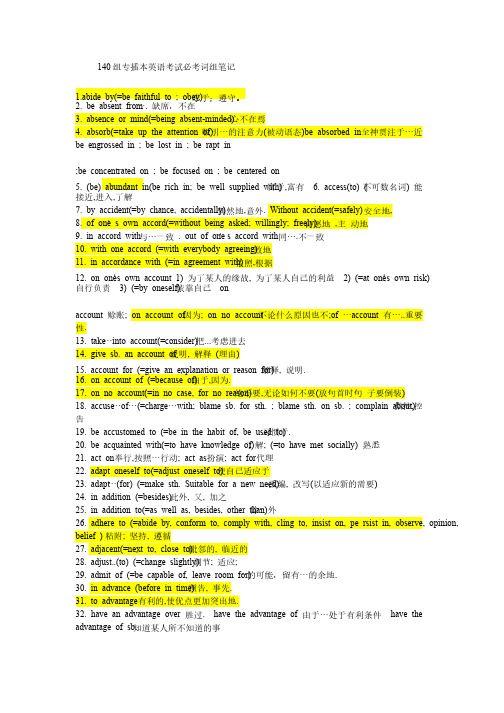
140组专插本英语考试必考词组笔记组专插本英语考试必考词组笔记1.abide by(=be faithful to ; obey)忠于;遵守。
忠于;遵守。
2. be absent from …. 缺席,不在缺席,不在3. absence or mind(=being absent-minded) 心不在焉心不在焉4. absorb(=take up the attention of)吸引…的注意力(被动语态)be absorbed in 全神贯注于…近全神贯注于…近be engrossed in ; be lost in ; be rapt in ;be concentrated on ; be focused on ; be centered on 5. (be) abundant in(be rich in; be well supplied with) 富于,富有富有6. access(to) (不可数名词) 能接近,进入,了解了解7. by accident(=by chance, accidentally)偶然地,意外. Without accident(=safely) 安全地安全地, 8. of one ’s own accord(=without being asked; willingly; freely)自愿地自愿地 ,主 动地动地9. in accord with 与…一致与…一致 . out of one ’s accord with 同…同….不一致不一致10. with one accord (=with everybody agreeing)一致地一致地11. in accordance with (=in agreement with) 依照,根据根据12. on one ’s own account 1) 为了某人的缘故, 为了某人自己的利益为了某人自己的利益 2) (=at one’s own risk) 自行负责自行负责 3) (=by oneself)依靠自己依靠自己 on account 赊账; on account of 因为; on no account 不论什么原因也不;of …account 有…..重要性. 13. take …into account(=consider)把...考虑进去考虑进去14. give sb. an account of 说明, 解释解释 (理由) 15. account for (=give an explanation or reason for) 解释, 说明. 16. on account of (=because of) 由于,因为. 17. on no account(=in no case, for no reason)绝不要,无论如何不要(放句首时句放句首时句 子要倒装) 18. accuse …of …(=charge …with; blame sb. for sth. ; blame sth. on sb. ; complain about) 指控,控告19. be accustomed to (=be in the habit of, be used to)习惯于. 20. be acquainted with(=to have knowledge of) 了解; (=to have met socially ) 熟悉熟悉21. act on 奉行奉行,按照…行动; act as 扮演扮演; act for 代理代理代理 22. adapt oneself to(=adjust oneself to) 使自己适应于使自己适应于23. adapt …(for) (=make sth. Suitable for a new need) 改编, 改写(以适应新的需要) 24. in addition (=besides) 此外, 又, 加之加之25. in addition to(=as well as, besides, other than)除…外除…外26. adhere to (=abide by, conform to, comply with, cling to, insist on, pe rsist in, observe, opinion, belief ) 粘附; 坚持, 遵循遵循27. adjacent(=next to, close to) 毗邻的, 临近的临近的28. adjust..(to) (=change slightly)调节; 适应; 29. admit of (=be capable of, leave room for) …的可能,留有…的余地. 30. in advance (before in time) 预告, 事先. 31. to advantage 有利的有利的,使优点更加突出地. 32. 32. have have have an an an advantage advantage advantage over over 胜过. have have the the the advantage advantage advantage of of 由于…处于有利条件由于…处于有利条件 have have the the advantage of sb.知道某人所不知道的事知道某人所不知道的事33. take advantage of (=make the best of, utilize, make use of, profit from, harness)利用. 34. agree with 赞同赞同(某人意见) agree to 同意同意同意 35. in agreement (with) 同意, 一致一致 36. ahead of 在…之前在…之前, 超过…;……………. ahead of time 提前. 37. in the air 1)不肯定, 不具体. 2)在谣传中在谣传中. 38. above all (=especially, most important of all) 尤其是, 最重要的. 39. in all (=counting everyone or everything, altogether) 总共, 总计总计40. after all 毕竟毕竟,到底; (not) at all 一点也不; all at once(=suddenly)突然; once and for all 只此一次; above all 最重要的最重要的; first of all 首先; all in all 大体上说; be all in 累极了; all but 几乎几乎. 41. allow for (=take into consideration, take into account) 考虑到, 估计到估计到 . 42. amount to (=to be equal to) 总计, 等于. 43. answer for (undertake responsibility for, be liable for, take charge for) 对…负责. 44. answer to (=conform to) 适合,符合. 45. be anxious about 为…焦急不安; 或anxious for 46. apologize to sb. for sth. 为…向…道歉为…向…道歉47. appeal to sb. for sth. 为某事向某人呼吁. appeal to sb. 对某人有吸引力对某人有吸引力48. apply to sb. for sth. 为…向…申请为…向…申请 ; apply for 申请; apply to 适用适用. 49. apply to 与…有关与…有关;适用适用50. approve of (=consent to, be in favor of, favor, agree to, consider good, right) 赞成, approve vt. 批准批准51. arise from(=be caused by) 由…引起. 52. arrange for sb.sth. to do sth. 安排…做…安排…做…53. arrive on 到达到达; arrive at 到达某地到达某地(小地方);得出,作出; arrive in 到达某地到达某地(大地方); 54. be ashamed of (=feel shame, guilt or sorrow because of sth. done) 以…以… 为羞耻为羞耻55. assure sb. of sth. (=try to cause to believe or trust in sth.) 向…保证, 使…确信. 56. attach(to) (=to fix, fasten; join) 缚, 系 ,结57. make an attempt at doing sth. (to do sth.) 试图做…试图做…58. 58. attend attend attend to to to (=give (=give (=give one one ’s s attention, attention, attention, care care care and and and thought)thought)注意,照顾;attend ;attend on(upon)(=wait on(upon)(=wait on(upon)(=wait upon, upon, serve, look after) 侍候侍候,照料照料59. attitude to toward …对…的态度.看法看法60. attribute …to …(=to believe sth. to be the result of …)把..归因于.., 认为..是..的结果的结果61. on the average (=on average, on an average) 平均平均62. (be) aware of (=be conscious of , having knowledge or consciousness)意识到,知道. 63. at the back of (=behind) 在…后面在…后面64. in the back of 在…后部(里面); on the back of 在…后部(外面); be on one ’s back(=be ill in bed) 卧病不起. 65. at one ’s back(=supporting or favoring sb.) 支持,维护; have sb. at one ’s back 有…支持, 有…作后台有…作后台66. turn one ’s back on sb. (=turn away from sb. in an impolite way) 不理睬(某人),背弃,抛弃抛弃67. behind one ’s back 背着某人(说坏话) 68. be based on upon 基于基于69. on the basis of 根据…, 在…基础上在…基础上70. beat …at 在…运动项目上打赢在…运动项目上打赢 78. by birth 在出生上在出生上,论出身,按血统按血统 at birth 在出生时; give birth to 出生出生79. blame sb. for sth. 因…责备某人因…责备某人 . blame sth. on sb. 把…推在某人身上在某人身上80. in blossom 开花(指树木) be in blossom 开花(强调状态) come into blossom 开花(强调动作)82. boast of (or about) 吹嘘吹嘘 84. in brief(=in as few words as possible)简言之简言之85. in bulk 成批地成批地,不散装的不散装的86. take the floor 起立发言起立发言89. last but one 倒数第二. 93. in any case(=for love or money, at any rate, at any price, at any cost , whatever happens; anyhow)无论如何无论如何97. be cautious of 谨防谨防 99. be certain of (=be sure of) 有把握, 一定. 100. for certain of (=for sure )肯定地,有把握地有把握地 103. charge sb. with …控告某人犯有……控告某人犯有… 107. round the clock(=all day and all night, usually without stopping) 昼夜不停地昼夜不停地 109. 109. commit commit commit oneself oneself oneself to to 使自己承担…使自己承担… commit commit sb. sb. sb. to to to prison prison 把某人送进监狱; ; commit commit commit one one ’s idea to writing 把某人的想法写下来把某人的想法写下来; commit a 115. in comparison with (=in contrast to) 和…比起来和…比起来116. compensate for (=give sth. to make up for) 补偿, 赔偿,弥补弥补 compensate sb. for sth. 赔偿赔偿,弥补弥补 117. 117. complain complain complain of of of (or (or (or about)about);;;complain ;complain about about ; ; complain complain complain to to to sb. sb. 抱怨); complement (补充); compliment (恭维) ply with (=act in accordance with a demand, order, rule etc.) 遵守, 依从依从123. in conclusion(=as the last thing)124. condemn sb. to 判决判决 125. on condition that (=if)以…为条件131. be confident of 有信心; confidential 机密的机密的 132. confine …to … 把…限制在某范围内把…限制在某范围内 133. confirm sb. in 使某人更坚定(信念等) 134. conform to (=be in agreement with, comply with) 符合,遵照,遵守;1)obey 136. congratulate sb. on 祝贺祝贺137. in connection with(=with regard to)关于, 138. be conscious of(=be aware of)觉察,知道知道139. consent to(=give agreement to permission)同意同意 140. in consequence (=as a result) 结果结果。
专插本重点语法
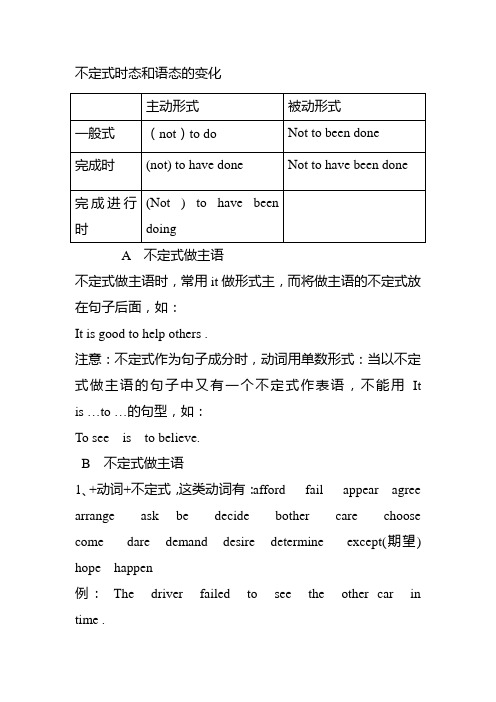
不定式时态和语态的变化A 不定式做主语不定式做主语时,常用it做形式主,而将做主语的不定式放在句子后面,如:It is good to help others .注意:不定式作为句子成分时,动词用单数形式:当以不定式做主语的句子中又有一个不定式作表语,不能用It is …to …的句型,如:To see is to believe.B 不定式做主语1、+动词+不定式,这类动词有:afford fail appear agree arrange ask be decide bother care choose come dare demand desire determine except(期望) hope happen例:The driver failed to see the other car in time .2、动词+宾语+不定式:这类动词有:ask beg choose except hate help intendlike love prepare prefer promise want wishI like you to keep everything tidy .C 不定式做定语被修饰的名词或代词与做定语的不定式在逻辑上的主谓关系:She has a brother to help her.被修饰的名词或代词与做定语的不定式在逻辑上的动宾关系:It was a game to remember另外,不定式还可以做某些抽象名词的定语My cousin expressed his intension to resign注意:当句子的主语是不定式的逻辑主语时,不定式使用主动式I have a lot of work to do today.当句子的主语不是不定式的逻辑主语时,不定式使用被动式I have a lot of work to be done today.(我今天有很多要被别人做的工作)D 不定式做状语作目的状语:He run so fast as to catch the first bus .作结果状语:表示事先没有预料到的,放在句子后面:He searched the room only to find nothing.作原因状语:I am glad to see you .注意:主语+系动词+to do 句式中,当形容词说明主语有某种特征时,不定式不使用被动式:The naughty boy is hard to deal with.动名词做主语、宾语、表语或定语,或者可以被副词修饰或者支配宾语A 动名词做主语:1、可以直接位于句首:Reading is an art .2、用it 做形式主语,把真正的主语位于句尾做后置主语:It is no use telling him to worry.3、用于“there be ”结构中做主语:There is no saying when he will comeB 动名词做宾语1、做非限制性动词的宾语:They went on walking and never stopped talking2、作介词宾语:We are thinking of making a new plan for the new term3作形容词的宾语:The music is worth listening to more than oneC动名词做表语动名词做表语的句子常表示无生命的事物的名词或是What引导的名词性从句,表语动名词与主语通常是对等关系,表示主语的内容,主语表于可以互换位置:Your task is cleaning the windows (Cleaning the window is your task )D 动名词作定语:动名词作定语位于被修饰名词的前面,表示被修饰名词的某种用途:The teacher has many reading materials.动名词的否定结构:动名词的否定结构由not 加动名词组成:Trying without success is better than not trying at all动名词的复合结构:1在动名词的复合结构中,逻辑主语是有生命的名词作主语时,必须用名词或代词的所有格,作宾语时,尤其在口语中,可以用名词的普通格或人称代词作宾语Do you think my going there will be of any help2逻辑主语是无生命的名词时通常用名词的所有格:Do you here the rain’s pattering on the roof3作逻辑主语是指定代词或是不定代词:this that somebody nobody anybody等用普通格:She was waken up by someone shouting outside。
插本英语必考语法
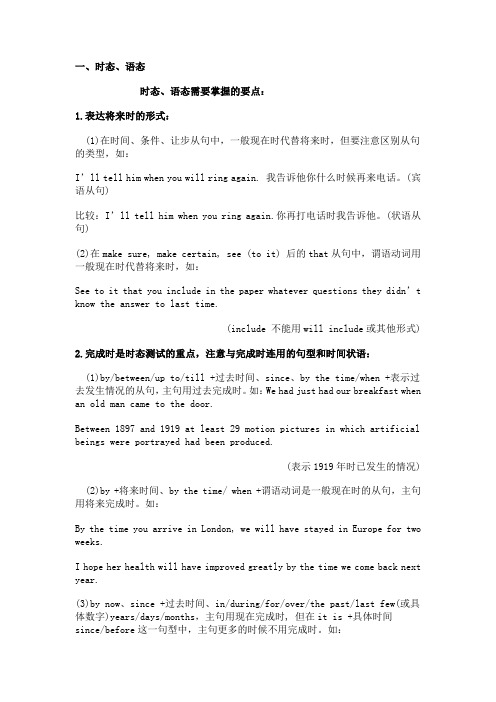
一、时态、语态时态、语态需要掌握的要点:1.表达将来时的形式:(1)在时间、条件、让步从句中,一般现在时代替将来时,但要注意区别从句的类型,如:I’ll tell him when you will ring again. 我告诉他你什么时候再来电话。
(宾语从句)比较:I’ll tell him when you ring again.你再打电话时我告诉他。
(状语从句)(2)在make sure, make certain, see (to it) 后的that从句中,谓语动词用一般现在时代替将来时,如:See to it that you include in the paper whatever questions they didn’t know the answer to last time.(include 不能用will include或其他形式)2.完成时是时态测试的重点,注意与完成时连用的句型和时间状语:(1)by/between/up to/till +过去时间、since、by the time/when +表示过去发生情况的从句,主句用过去完成时。
如:We had just had our breakfast when an old man came to the door.Between 1897 and 1919 at least 29 motion pictures in which artificial beings were portrayed had been produced.(表示1919年时已发生的情况)(2)by +将来时间、by the time/ when +谓语动词是一般现在时的从句,主句用将来完成时。
如:By the time you arrive in London, we will have stayed in Europe for two weeks.I hope her health will have improved greatly by the time we come back next year.(3)by now、since +过去时间、in/during/for/over/the past/last few(或具体数字)years/days/months,主句用现在完成时, 但在it is +具体时间since/before这一句型中,主句更多的时候不用完成时。
专插本英语必考词组
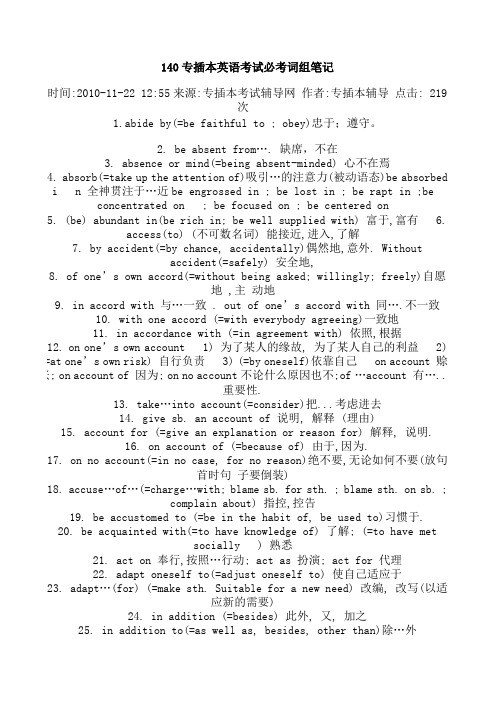
140专插本英语考试必考词组笔记时间:2010-11-22 12:55来源:专插本考试辅导网作者:专插本辅导点击:219次1.abide by(=be faithful to ; obey)忠于;遵守。
2. be absent from…. 缺席,不在3. absence or mind(=being absent-minded) 心不在焉4. absorb(=take up the attention of)吸引…的注意力(被动语态)be absorbedi n 全神贯注于…近be engrossed in ; be lost in ; be rapt in ;beconcentrated on ; be focused on ; be centered on5. (be) abundant in(be rich in; be well supplied with) 富于,富有6.access(to) (不可数名词) 能接近,进入,了解7. by accident(=by chance, accidentally)偶然地,意外. Withoutaccident(=safely) 安全地,8. of one’s own accord(=without being asked; willingly; freely)自愿地 ,主动地9. in accord with 与…一致. out of one’s accord with 同….不一致10. with one accord (=with everybody agreeing)一致地11. in accordance with (=in agreement with) 依照,根据12. on one’s own account 1) 为了某人的缘故, 为了某人自己的利益 2) (=at one’s own risk) 自行负责 3) (=by oneself)依靠自己 on account 赊账; on account of 因为; on no account不论什么原因也不;of …account 有…..重要性.13. take…into account(=consider)把...考虑进去14. give sb. an account of 说明, 解释 (理由)15. account for (=give an explanation or reason for) 解释, 说明.16. on account of (=because of) 由于,因为.17. on no account(=in no case, for no reason)绝不要,无论如何不要(放句首时句子要倒装)18. accuse…of…(=charge…with; blame sb. for sth. ; blame sth. on sb. ;complain about) 指控,控告19. be accustomed to (=be in the habit of, be used to)习惯于.20. be acquainted with(=to have knowledge of) 了解; (=to have metsocially ) 熟悉21. act on 奉行,按照…行动; act as 扮演; act for 代理22. adapt oneself to(=adjust oneself to) 使自己适应于23. adapt…(for) (=make sth. Suitable f or a new need) 改编, 改写(以适应新的需要)24. in addition (=besides) 此外, 又, 加之25. in addition to(=as well as, besides, other than)除…外26. adhere to (=abide by, conform to, comply with, cling to, insist on,pe rsist in, observe, opinion, belief ) 粘附; 坚持, 遵循27. adjacent(=next to, close to) 毗邻的, 临近的28. adjust..(to) (=change slightly)调节; 适应;29. admit of (=be capable of, leave room for) …的可能,留有…的余地.30. in advance (before in time) 预告, 事先.31. to advantage 有利的,使优点更加突出地.32. have an advantage over 胜过. have the advantage of 由于…处于有利条件 have the advantage of sb.知道某人所不知道的事33. take advantage of (=make the best of, utilize, make use of, profitfrom, harness)利用.34. agree with 赞同(某人意见) agree to 同意35. in agreement (with) 同意, 一致36. ahead of 在…之前, 超过…;……………. ahead of time 提前.37. in the air 1)不肯定, 不具体. 2)在谣传中.38. above all (=especially, most important of all) 尤其是, 最重要的.39. in all (=counting everyone or everything, altogether) 总共, 总计40. after all 毕竟,到底; (not) at all 一点也不; all at once(=suddenly)突然; once and for all 只此一次; above all 最重要的; first of all 首先;all in all 大体上说; be all in 累极了; all but 几乎.41. allow for (=take into consideration, take into account) 考虑到, 估计到 .42. amount to (=to be equal to) 总计, 等于.43. answer for (undertake responsibility for, be liable for, take chargefor) 对…负责.44. answer to (=conform to) 适合,符合.45. be anxious about 为…焦急不安; 或anxious for46. apologize to sb. for sth. 为…向…道歉47. appeal to sb. for sth. 为某事向某人呼吁. appeal to sb. 对某人有吸引力48. apply to sb. for sth. 为…向…申请 ; apply for申请; apply to 适用.49. apply to 与…有关;适用50. approve of (=consent to, be in favor of, favor, agree to, considergood, right) 赞成, approve vt. 批准51. arise from(=be caused by) 由…引起.52. arrange for sb.sth. to do sth. 安排…做…53. arrive on 到达; arrive at 到达某地(小地方);得出,作出; arrive in 到达某地(大地方);54. be ashamed of (=feel shame, guilt or sorrow because of sth. done)以… 为羞耻55. assure sb. of sth. (=try to cause to believe or trust in sth.) 向…保证, 使…确信.56. attach(to) (=to fix, fasten; join) 缚, 系 ,结57. make an attempt at doing sth. (to do sth.) 试图做…58. attend to (=give one’s attention, care and thought)注意,照顾;attendon(upon)(=wait upon, serve, look after) 侍候,照料59. attitude to toward …对…的态度.看法60. attribute…to…(=to believe sth. to be the result of…)把..归因于..,认为..是..的结果61. on the average (=on average, on an average) 平均62. (be) aware of (=be conscious of , having knowledge or consciousness)意识到,知道.63. at the back of (=behind) 在…后面64. in the back of 在…后部(里面); on the back of 在…后部(外面); be onone’s back(=be ill in bed) 卧病不起.65. at one’s back(=supporting or favoring sb.) 支持,维护; have sb. atone ’s back 有…支持, 有…作后台66. turn one’s back on sb. (=turn away from sb. in an impolite way) 不理睬(某人),背弃,抛弃67. behind one’s back 背着某人(说坏话)68. be based on upon 基于69. on the basis of 根据…, 在…基础上70. beat…at 在…运动项目上打赢71. begin with 以…开始. to begin with (=first of all) 首先, 第一(经常用于开始语)72. on behalf of (=as the representative of) 以…名义73. believe in(=have faith or trust in; consider sth.sb. to be true) 相信,依赖,信仰.74. benefit (from) 受益,得到好处.75. for the benefit of 为了…的利益(好处)76. for the better 好转77. get the better of (=defeat sb.) 打败, 胜过.78. by birth 在出生上,论出身,按血统 at birth 在出生时; give birth to 出生79. blame sb. for sth. 因…责备某人 . blame sth. on sb. 把…推在某人身上80. in blossom开花(指树木) be in blossom开花(强调状态) come into blossom开花(强调动作)81. on board 到船上, 在船上, 上火车或飞机82. boast of (or about) 吹嘘83. out of breath 喘不过气来84. in brief(=in as few words as possible)简言之85. in bulk 成批地,不散装的86. take the floor 起立发言87. on business 出差办事.88. be busy with sth.于某事。
广东专插本语法总结
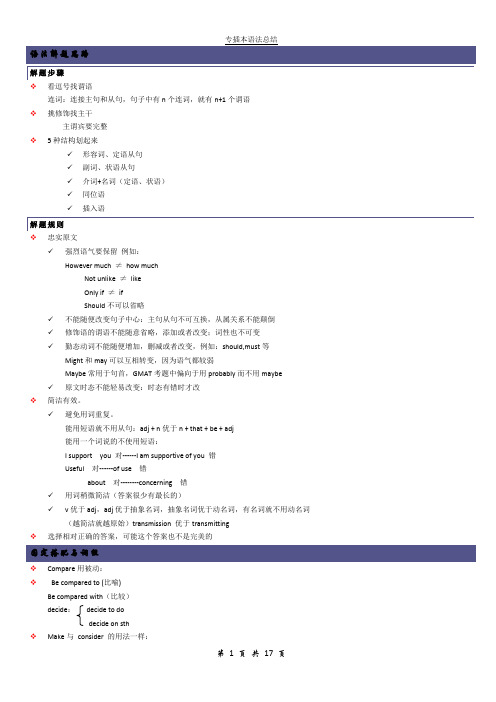
语法解题思路解题步骤看逗号找谓语连词:连接主句和从句,句子中有n个连词,就有n+1个谓语挑修饰找主干主谓宾要完整5种结构划起来✓形容词、定语从句✓副词、状语从句✓介词+名词(定语、状语)✓同位语✓插入语忠实原文✓强烈语气要保留例如:However much ≠how muchNot unlike ≠likeOnly if ≠ifShould不可以省略✓不能随便改变句子中心:主句从句不可互换,从属关系不能颠倒✓修饰语的谓语不能随意省略,添加或者改变;词性也不可变✓勤态动词不能随便增加,删减或者改变,例如:should,must等Might和may可以互相转变,因为语气都较弱Maybe常用于句首,GMAT考题中偏向于用probably而不用maybe ✓原文时态不能轻易改变:时态有错时才改简洁有效。
✓避免用词重复。
能用短语就不用从句:adj + n优于n + that + be + adj能用一个词说的不使用短语:I support you 对------I am supportive of you 错Useful 对------of use 错about 对--------concerning 错✓用词稍微简洁(答案很少有最长的)✓v优于adj,adj优于抽象名词,抽象名词优于动名词,有名词就不用动名词(越简洁就越原始)transmission 优于transmitting选择相对正确的答案,可能这个答案也不是完美的固定搭配与词组Compare用被动:Be compared to (比喻)Be compared with(比较)decide:decide to dodecide on sthMake与consider 的用法一样:make/consider+n1+n2make/consider +n+adjmake/consider + it + adj+ to do (it 指代后面的不定式)responsible:Be responsible for sth(对什么事情负责)Be responsible to sb(向谁负责)descend:a descendant of sb某个人的后代n.descend from sb 某个人遗传下来的v.prohibit sb from doing 或prohibit sth(GMAT偏好使用)Forbid sb to do 或forbid sth错误表达:forbid / prohibit that(不能带从句); Forbid sb from doing, prohibit sb to doprevent / prohibit / keep / inhibit / discourage / stop / withhold等所有與禁止有關的介詞都用from,並盡量在其後接表動作的Ving.from前要加受詞.只有forbit + to 例外另外, 所有與禁止有關的字不可用that子句.常用在比较中的表达形式:as be the case(是as the case be的倒装形式)例句:As would be the case with any star of similar mass, once the Sun exhausts the hydrogen in its core, it will expand into a red giant and eventually eject its outer envelope of gases to become a white dwarf.regard…as…depict…as…think of…asview…as…number:the number of students is 数量a number of students are 大量的numbers of students are 不计其数的each:each of n +单数谓语:each of the students is名词复数+ each +复数谓语students each areso … that…不同的主谓结构,两个主语是不同的主体so… as to 只用在单一主谓结构,同一个主语just as….so注意错误表达:没有such that,也没有such as tohelp 的用法:help (sb) to dohelp (sb) dohelpful inhelp 做名词时可以用give help in doing 或者give help with doingdifficult 的用法:have difficluties in doing sth (n)difficult to do sth (v)do sth with difficulty (n)knownbe known for 因xx而著名be known as = by the name of 作为xx而著名be known to do 因做xx事情而著名没有be known byrequirerequire sb to dorequire that (shoule省略)sb/sth be required to dorequire doing(客观需要,表示被动)the hair require cutting接不定式的词:迫使倾向叙述词,目标功能7个词:Force sb to doAllow sb to doCause sb to dBe more likely to doBe inclined to doBe disinclined to doBe liable to do (这个词一般不用,表示主语发生了不好的事情)V+doing 的动词Consider: consider doing /consider + sb + sb /consider + n + adjContemplate doing(沉思)Object to doingMind doingPermit doing / permit sb to doAvoid doingResist doingEscape doingMiss doingImagine doingSuggest doingTolerate doingAppreciate doingKeep doingEnjoy doingDistinguishDistinguish A from BDistinguish between A and BTo + doing/nAttribute to doingAscribe to doing 归因Adhere to doing 坚持Lead to doing 导致Pay attention to doingStick to doingIn contrast to doingCredit sth/sb to sth/doing 认为…有优势;credit to 记入,credit with 归因于(考过)Yield to doing 屈服Delicate to doing 献给Object to doing 反对Get used to doingNumbers:不计其数Aid in doing/ sthA dispute over sthTarget at sthBe in danger ofGear to+ n. 对某事物加以调节以适合某种需要或达到某种水平或标准Be native to 土生土长只用现在时,不用过去式,表示一种事实Incentive:经济方面的刺激The likelihood of sth (错误搭配:the likelihood for )表示沮丧的词:depressed, morose, gloom, upsetWage是指周工资Modeled..after..以…的样子/图形制作Project A onto B:将A放在B的情况去考虑习惯用语whether A, B, or Cin which case,固定搭配,“在这种情况下”习惯用语:the extent of sth 或者to …extent, 表示…的范围习惯用语:the degree to sth 或者to…degree, 表示…的程度At a time when固定搭配低估和高估:over estimated that…. And under estimated that….rate 當錢時, 用for→ soaring rates for insurance.大于等于的说法:As great as or greater thanAt least as great as发生转义的词(应尊重原文意思,通常不改变)significant 重要的,有意义的significantly大大的=greatlydisadvantageddisadvantagecost两个意思:1: 生产成本,常用复数;2: 价格,费用,常用单数。
专插本英语时态语法短语总结汇总

专插本英语时态语法短语总结汇总英语时态是指用来表示动作或状态在时间上的位置关系的语法形式。
掌握英语时态对于准确表达动作和描述事件的时间轴非常重要。
下面是一些常用的英语时态和短语总结:一、一般现在时(Simple Present Tense)1.句型:主语+动词原形/第三人称单数动词+其他2.意义:表示经常性、习惯性或普遍性的动作或状态。
3. 示例:I play football every Sunday.(我每个星期天踢足球)二、现在进行时(Present Continuous Tense)1. 句型:主语 + am/is/are + 现在分词 + 其他2.意义:表示正在进行的动作或现阶段的状态。
3. 示例:She is watching TV now.(她正在看电视)三、一般过去时(Simple Past Tense)1.句型:主语+动词过去式+其他2.意义:表示过去发生的动作或状态。
3. 示例:I went to the cinema yesterday.(我昨天去了电影院)四、过去进行时(Past Continuous Tense)1. 句型:主语 + was/were + 现在分词 + 其他2.意义:表示过去一些时间正在进行的动作。
3. 示例:They were playing basketball at 5 p.m. yesterday.(他们昨天下午5点在打篮球)五、一般将来时(Simple Future Tense)1. 句型:主语 + will/shall + 动词原形 + 其他2.意义:表示将来发生的动作或状态。
3. 示例:She will go to the library tomorrow.(她明天要去图书馆)六、将来进行时(Future Continuous Tense)1. 句型:主语 + will/shall + be + 现在分词 + 其他2.意义:表示将来一些时间正在进行的动作。
专插本考试-C语言

专插本考试-C语言介绍C语言是一种广泛使用的计算机编程语言,特别适合开发系统软件和应用软件。
专插本考试中的C语言部分通常包括基本语法、程序结构、变量和数据类型、流程控制、函数、数组和指针等内容。
掌握C语言对于专插本考试和日后从事计算机相关工作都是非常重要的。
本文将介绍专插本考试-C语言部分的一些重要知识点,并提供一些学习和备考的建议。
重要知识点1. 基本语法C语言的基本语法包括注释、标识符、关键字、数据类型和变量等。
正确理解和使用这些基本语法对于编写可读性高、易于维护的代码非常重要。
在备考过程中,建议复习并搞清楚C语言的基本语法规则。
2. 程序结构一般而言,C语言的程序包括预处理指令、函数定义和主函数。
了解程序结构的组成部分和执行顺序对于理解C语言程序的运行机制至关重要。
3. 变量和数据类型C语言中有多种数据类型,包括整型、浮点型、字符型等。
了解每种数据类型的特点和使用方法,以及变量的声明和赋值等操作是非常重要的。
4. 流程控制流程控制是编程中的重要概念,它决定了程序的执行顺序。
C语言提供了多种流程控制语句,如条件语句(if-else语句)、循环语句(for循环、while循环)等。
熟悉这些流程控制语句的使用方法,能够更好地控制程序的执行流程。
5. 函数函数是C语言中的重要概念,它将一组语句组织在一起以完成某种特定的功能。
在备考C语言部分时,理解函数的定义、调用和参数传递等基本知识是必须的。
6. 数组和指针数组和指针是C语言中用于处理一系列数据的重要工具。
备考过程中,建议理解数组和指针的概念、声明和使用方法,并能够熟练地进行数组和指针之间的转换。
学习和备考建议1. 阅读教材和参考资料在备考C语言部分时,阅读专业教材和参考资料是非常重要的。
可以根据自己的情况选择一些经典教材,如《C Primer Plus》、《C Programming Language》等,也可以参考一些网络上的资源,如在线教程、博客文章等。
专插本重要 语法

1、a number of/ the number of 、
A number of our classmates are A number of students The number of our classmates love English. playing. is 45.
a number of = a lot of =many .修饰可数名词 ,后接复数形式。 修饰可数名词 the number of 表示数目。后面的be动词一般为单数。is/was
3、虚拟语气在ห้องสมุดไป่ตู้语从句中的应用
• 主语从句中的谓语动词如果是decide, desire, demand, order, propose, insist, recommend, require, suggest, advise, command, 等表 示“建议”、“命令”、“请求”、“要求”含义的动词时,主 句谓语动词用“动词原形”或“should+动词原形”。 真题再现: 真题再现 1.It is politely requested by the hotel management that radios _____ after 11 o’clock at night. A. C. were not played not be played B. not to play D. did not play
If I had remembered to close the window, the thief would not have got in.
如果有一天我长了翅膀, 我想飞上月球。 If I had/should have wings one day, I would fly to the moon.
专插本_大学英语语法篇:高频英语语法

表语:定义用在系词之后,表明主语的年龄、身份、状态、特征等的句子成分。
特征:找准系词,后面的就是表语啦系词分三类:1各种be(is am are was were)2感官动词feel look sound taste smell3表示变化和不变的词get turn go become(变化) keep stay remain(不变)举例this is(a good book)he feels(cold)his face(turned red)the food(went bad)the baby(stays healthy)括号内为表语宾语:宾语是动作、行为的对象,是动作的承受者。
宾语由名词、代词、不定式或相当于名词的词、短语来担任。
宾语补足语就是用来对宾语加以补充说明的文字,和宾语一起构成复合宾语。
可做宾语补足语的通常有名词,形容词、副词、不定式,分词等。
宾语和宾语补足语之间在逻辑上往往有主表、或者主谓的关系。
I found him clever.clever就是宾补,和him有主表的关系,即我们可以说:He is clever。
I saw her playing on the playground.playing就是宾补,和宾语her 有主谓逻辑关系,即我们可以说:She is playing。
宾语补足语就是用来对宾语加以补充说明的通常是说明宾语的特征、性质、状态或者身份等。
定语:用来说明名词或代词的品质与特征的词,短语或从句,在句子中就称为定语.可以用作定语的词或结构,有下列一些,各举一例如下(定语用大写体表示):1.形容词It is a RED bag.(它是一只红色的书包.)2.名词或名词的所有格Mother made a BIRTHDAYcake for me.(妈妈给我做了个生日蛋糕.)LI MING'S father is a professor.(李明的爸爸是一位教授.)3.代词YOUR hair needs washing.(你的头发需要洗了.)4.数词I have read this book THREE times.(我已读过这本书三遍了.)5.分词China is a DEVELOPING country.(中国是个发展中国家.)[现在分词]The United States is a DEVELOPED country.(美国是个发达国家.)[过去分词]6.动名词LEARNING method is importanr for us.(学习方法对我们而言很重要.)7.副词Xiao Hong lives in the room ABOVE.(小红住在上面的房间里.)8.不定式Would you want something TO EAT?(你想吃点什么东西吗?)9.介词短语This is a map OF BEIJING.(这是一幅北京地图.)10.从句He repeated everything THAT SHE HAS SAID.(他重复了她说的每件事.)定语在句子中的位置单词作定语时通常放在它所修饰的名次的前面.如果所修饰的名词带有冠词,放在冠词和名词之间.副词,不定式,介词短语和从句作定语时,要放在被修饰词的后面.修饰some,any,no,every等所构成的复合不定代词时,定语要放在它的后面例如:I have told you everything IMPORTANT that I know.(我把我知道的每件重要的事都告诉你了.)英语状语英语中,修饰动词、形容词、副词等的句子成分叫状语(adverbial)。
- 1、下载文档前请自行甄别文档内容的完整性,平台不提供额外的编辑、内容补充、找答案等附加服务。
- 2、"仅部分预览"的文档,不可在线预览部分如存在完整性等问题,可反馈申请退款(可完整预览的文档不适用该条件!)。
- 3、如文档侵犯您的权益,请联系客服反馈,我们会尽快为您处理(人工客服工作时间:9:00-18:30)。
专插本必备语法一、时态、语态时态、语态需要掌握的要点:1.表达将来时的形式:(1)在时间、条件、让步从句中,一般现在时代替将来时,但要注意区别从句的类型,如:I’ll tell him when you will ring again. 我告诉他你什么时候再来电话。
(宾语从句)比较:I’ll tell him when you ring again.你再打电话时我告诉他。
(状语从句)(2)在make sure, make certain, see (to it) 后的that从句中,谓语动词用一般现在时代替将来时,如:See to it that you include in the paper whatever questions they didn’t know the answer to last time.(include 不能用will include或其他形式) 2.完成时是时态测试的重点,注意与完成时连用的句型和时间状语:(1)by/between/up to/till +过去时间、since、by the time/when +表示过去发生情况的从句,主句用过去完成时。
如:We had just had our breakfast when an old man came to the door.Between 1897 and 1919 at least 29 motion pictures in which artificial beings were portrayed had been produced.(表示1919年时已发生的情况) (2)by +将来时间、by the time/ when +谓语动词是一般现在时的从句,主句用将来完成时。
如:By the time you arrive in London, we will have stayed in Europe for two weeks.I hope her health will have improved greatly by the time we come back next year.(3)by now、since +过去时间、in/during/for/over/the past/last few(或具体数字)years/days/months,主句用现在完成时, 但在it is +具体时间since/before这一句型中,主句更多的时候不用完成时。
如:The changes that had taken place in air travel during the last sixty years would have seemed completely impossible to even the most brilliant scientists at the turn of the 19th century.It is four years since John left school.(4)在It is the +序数词/形容词最高级+that的定语从句中,谓语动词常用现在完成时。
如:It isn’t the first time that I have found myself in an embarrassing situation.(5)在no sooner…than…, hardly/scarcely…when…句型中,主句常用过去完成时。
3.完成进行时指动作在完成时的基础上还要继续下去。
如:The company has been promising a rise in salary for ages, but nothing has happened.时态、语态答题思路:(1)先根据选项的区别点确定考题要点为时态,然后回到题句中寻找给出的或暗示的时间状语,缩小选择范围,进而选出正确答案;(2)根据谓语动词与句子主语或非谓语动词与其逻辑主语的关系,确定句子是主动语态还是被动语态。
二、不定式1.不定式做主语(1)引导逻辑主语的介词:不定式的逻辑主语一般由介词for引导,但下列表示人的性格行为特征的形容词做表语时, 不定式的逻辑主语则由of引导:absurd, bold, brave, courageous, careful, careless, clever, wise, foolish, silly, stupid, good, nice, kind, thoughtful, considerate, greedy, generous, honest, modest, polite, rude, cruel, selfish, lazy, wicked, wrong。
如:Experts say walking is one of the best ways for a person to stay healthy.It’s clever of you to have invented such a device.(2)不定式做主语补足语:掌握常用不定式做主语补足语的句型。
注意不定式表示的动作发生的时间,并采用相应形式。
如:be said / reported / thought / believed / known / supposed + to do sth.2.不定式做宾语掌握要求接不定式做宾语的动词:afford, arrange, attempt, claim, desire, determine, expect, fail, guarantee, endeavor, intend, pledge, pretend, resolve, request, swear, tend, venture。
如:Even though the children pretended to be asleep, the nurses were not deceived when they came into the room. 3.不定式做定语(1)被修饰的名词前有序数词、形容词最高级或next, last, only, not a, the, very等限定词时,该名词用不定式做定语。
如:the first woman to set foot on the moon 第一个登上月球的女性(2)如果其动词要求不定式做宾语,相应的名词一般用不定式做定语。
如:tendency to do→tend to do, decision to do→decide to doThis book is an attempt to help you use English and recognize how it is used.(3)如果其形容词形式要求接不定式做补语,相应的名词一般用不定式做定语。
如:ambition to do “干……的雄心”→be ambitious to do“有雄心干……”curiosity to do “对……的好奇心”→be curious to do“对……好奇”ability to do“做……的能力”→able to do“有能力做……”According to Darwin, random changes that enhance a species’ ability to survive are naturally selected and passed on to succeeding generation.(4)表示方式、原因、时间、机会、权利等名词用不定式做定语,这些名词包括:way, method, reason, time, place, chance, occasion, opportunity, evidence, power, right, movement, drive (运动),effort等。
如:I worked so late in the office last night that I hardly had time to catch the last bus.We appreciate your efforts to bring about a comprehensive solution to the existing problem.(5)不定代词something, nothing, little, much, a lot习惯上用不定式做定语。
如:Though we have made great progress, there is still much to be improved.4.不定式做状语不定式做状语主要表示目的、程度、结果、方式。
(1)in order to(do), so as to(do)结构引导目的状语,so as to不能置于句首。
如:(2)so…as to, such…as to, enough…to, too…to结构做程度状语。
如:The solution works only for couples who are self-employed, don’t have small children and get along well enough to spend most of their time together.The vocabulary and grammatical differences between British and American English are so trivial and few as hardly to be noticed.(3)不定式做结果状语只能出现在句子的末尾,表示不愉快的结果,有时用only加强语气。
常见的不定式动词有find, hear, see, be told, form, give, make, produce等。
如:Greatly agitated, I rushed to the apartment and tried the door, only to find it locked.(4)not/never too… to, too… not to, but/only too…to, too rea dy/eager/apt/inclined to表示肯定意义。
如:I am only too pleased to hear from you further. 能再听到你的消息,我太高兴了。
三、动名词1.必须接动名词做宾语的动词牢记下列要求接动名词做宾语的动词:acknowledge, advocate, anticipate, appreciate, avoid, admit, confess, consider, delay, deny, enjoy, escape, excuse,fancy, favor, finish, forgive, imagine, involve, justify, mention, pardon, practice, postpone, recall,recollect,risk, resist, suggest, tolerate。
